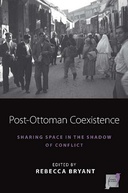Explore
In Southeast Europe, the Balkans, and Middle East, scholars often refer to the “peaceful coexistence” of various religious and ethnic groups under the Ottoman Empire before ethnonationalist conflicts dissolved that shared space and created legacies of division. "Post-Ottoman Coexistence", interrogates ways of living together and asks what practices enabled centuries of cooperation and sharing, as well as how and when such sharing was disrupted. Contributors discuss both historical and contemporary practices of coexistence within the context of ethno-national conflict and its aftermath.This title was made Open Access by libraries from around the world through Knowledge Unlatched.
This book is included in DOAB.
Why read this book? Have your say.
You must be logged in to comment.
Rights Information
Are you the author or publisher of this work? If so, you can claim it as yours by registering as an Unglue.it rights holder.Downloads
This work has been downloaded 593 times via unglue.it ebook links.
- 184 - pdf (CC BY-NC-ND) at OAPEN Library.
- 77 - pdf (CC BY-NC-ND) at Unglue.it.
- 178 - pdf (CC BY-NC-ND) at OAPEN Library.
- 82 - pdf (CC BY-NC-ND) at OAPEN Library.
Keywords
- Armenians
- Burgas
- Conflict & Peace Studies
- Interdisciplinary Studies
- Istanbul
- KUnlatched
- Muslims
- Ottoman Empire
- Peace studies & conflict resolution
- Political Science
- Politics
- Reference, information & interdisciplinary subjects
- thema EDItEUR::G Reference, Information and Interdisciplinary subjects::GT Interdisciplinary studies::GTU Peace studies and conflict resolution
- turkey
Links
DOI: 10.2307/j.ctt1kgqw2hEditions

